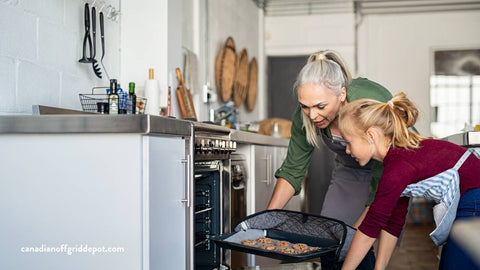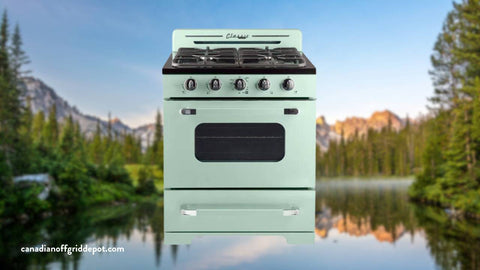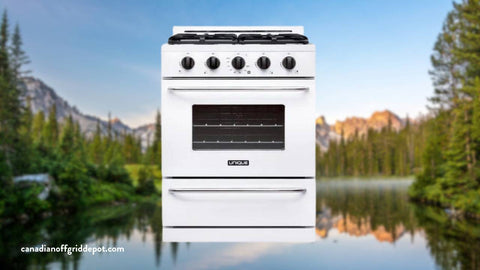One of the biggest improvements to off-grid quality of life is having a convenient way to cook. After all, you’re preparing meals three times a day, every single day. If cooking is a hassle, it takes some of the pleasure out of living off-grid, no matter how nice the sunsets are off your back deck.
Fortunately, there are lots of options available for off-grid cooking. Canadian Off Grid Depot recommends propane ranges that are specifically designed for off-grid operation.
Why Not Electric?
Electric ranges may seem appealing based on the idea that you could run them off solar. But they draw extreme amounts of energy, requiring hefty solar battery and panel setups, as well as cooperative weather and a good location for panels. Light levels are at their lowest during the times you’re most likely to be cooking – early morning and late afternoon – which is also when you’re drawing the most power to run all your other household appliances. A solar setup robust enough to handle that draw is pricey and you would probably still need a fossil-fuel backup generator to handle long periods of inclement weather. Electric ranges just aren’t practical for most off-grid situations.

Practical Propane May Be Greener Than You Think
Propane is relatively cheap, easy to haul, easy to find, and easy to service. It’s often seen as a greener choice than natural gas – it’s methane-free, burns cleaner, and produces two and a half times the energy from a cubic foot of fuel in comparison to natural gas. Propane is easy to transport to an off-grid site, either in bottles you buy and move yourself or by having a delivery truck fill a large tank. If you’re using propane year-round for several different appliances, you might need to fill a 250 gallon propane tank three to four times a year. If you’re only at your cabin during the season or on weekends, smaller bottles you haul yourself may be all you need. All of this makes propane our fuel of choice for cooking off-grid in most circumstances.
What to Look For
On-grid gas or propane ranges typically have hot surface igniter (HSI) systems to ignite the burners and oven in order to avoid having to light a pilot manually. They are always on and can draw significant electrical power.
Specialty off-grid ranges have battery ignition systems that run off a small battery (such as a standard D cell) instead of HSI systems so they are not drawing electrical power from another source. Their oven pilots are intermittent pilots that only run when you’re using the oven, which is a big savings in energy requirements. These ranges have mechanical thermostats and no electronics - no electronic boards, digital displays, or convection fans, all of which require power and can be sensitive to electrical surges.
All of this means that you get tremendous energy savings while still enjoying the benefits of automatic ignition and a range that needs fewer repairs.
Our Top Models
This is Unique's 30" propane off-grid classic range, in white (also available in black). Everything in this range is mechanical - the only electricity needed is a D-cell battery to run the match-less automatic ignition system. Continuous cast-iron grates and sealed burners make cleanup easy and allow for safe movement of cookware. It comes fitted for propane but a natural gas adapter kit is also included. Unique also offers 24" and 20" versions of this stove as well.

This stylish option is Unique's classic retro version of the off-grid propane range, in mint green (also available in white). It features the same off-grid focused design as the classic style model - mechanical thermometer, no electronics with just the ignition system running off a D-cell battery and the option to use natural gas with the adapter kit included. The only difference is the styling, which matches the rest of Unique's Classic Retro line of appliances. It also comes in a 24" version (but there is no 20" version of this model).
Having a full range at your off-grid cottage, cabin, or camp can make a big difference in comfort and convenience. Cooking off-grid can be just as convenient as cooking in the city, as long as you have the right tools.








